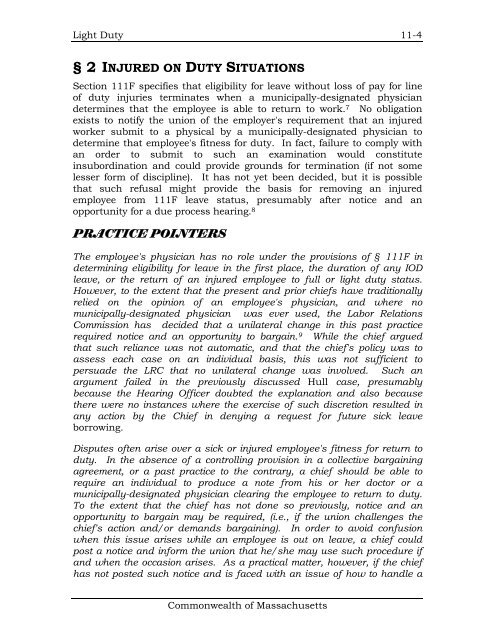Management Rights - AELE's Home Page
Management Rights - AELE's Home Page
Management Rights - AELE's Home Page
You also want an ePaper? Increase the reach of your titles
YUMPU automatically turns print PDFs into web optimized ePapers that Google loves.
Light Duty 11-4<br />
§ 2 INJURED ON DUTY SITUATIONS<br />
Section 111F specifies that eligibility for leave without loss of pay for line<br />
of duty injuries terminates when a municipally-designated physician<br />
determines that the employee is able to return to work. 7 No obligation<br />
exists to notify the union of the employer's requirement that an injured<br />
worker submit to a physical by a municipally-designated physician to<br />
determine that employee's fitness for duty. In fact, failure to comply with<br />
an order to submit to such an examination would constitute<br />
insubordination and could provide grounds for termination (if not some<br />
lesser form of discipline). It has not yet been decided, but it is possible<br />
that such refusal might provide the basis for removing an injured<br />
employee from 111F leave status, presumably after notice and an<br />
opportunity for a due process hearing. 8<br />
PRACTICE POINTERS<br />
The employee's physician has no role under the provisions of § 111F in<br />
determining eligibility for leave in the first place, the duration of any IOD<br />
leave, or the return of an injured employee to full or light duty status.<br />
However, to the extent that the present and prior chiefs have traditionally<br />
relied on the opinion of an employee's physician, and where no<br />
municipally-designated physician was ever used, the Labor Relations<br />
Commission has decided that a unilateral change in this past practice<br />
required notice and an opportunity to bargain. 9 While the chief argued<br />
that such reliance was not automatic, and that the chief's policy was to<br />
assess each case on an individual basis, this was not sufficient to<br />
persuade the LRC that no unilateral change was involved. Such an<br />
argument failed in the previously discussed Hull case, presumably<br />
because the Hearing Officer doubted the explanation and also because<br />
there were no instances where the exercise of such discretion resulted in<br />
any action by the Chief in denying a request for future sick leave<br />
borrowing.<br />
Disputes often arise over a sick or injured employee's fitness for return to<br />
duty. In the absence of a controlling provision in a collective bargaining<br />
agreement, or a past practice to the contrary, a chief should be able to<br />
require an individual to produce a note from his or her doctor or a<br />
municipally-designated physician clearing the employee to return to duty.<br />
To the extent that the chief has not done so previously, notice and an<br />
opportunity to bargain may be required, (i.e., if the union challenges the<br />
chief's action and/or demands bargaining). In order to avoid confusion<br />
when this issue arises while an employee is out on leave, a chief could<br />
post a notice and inform the union that he/she may use such procedure if<br />
and when the occasion arises. As a practical matter, however, if the chief<br />
has not posted such notice and is faced with an issue of how to handle a<br />
Commonwealth of Massachusetts
















